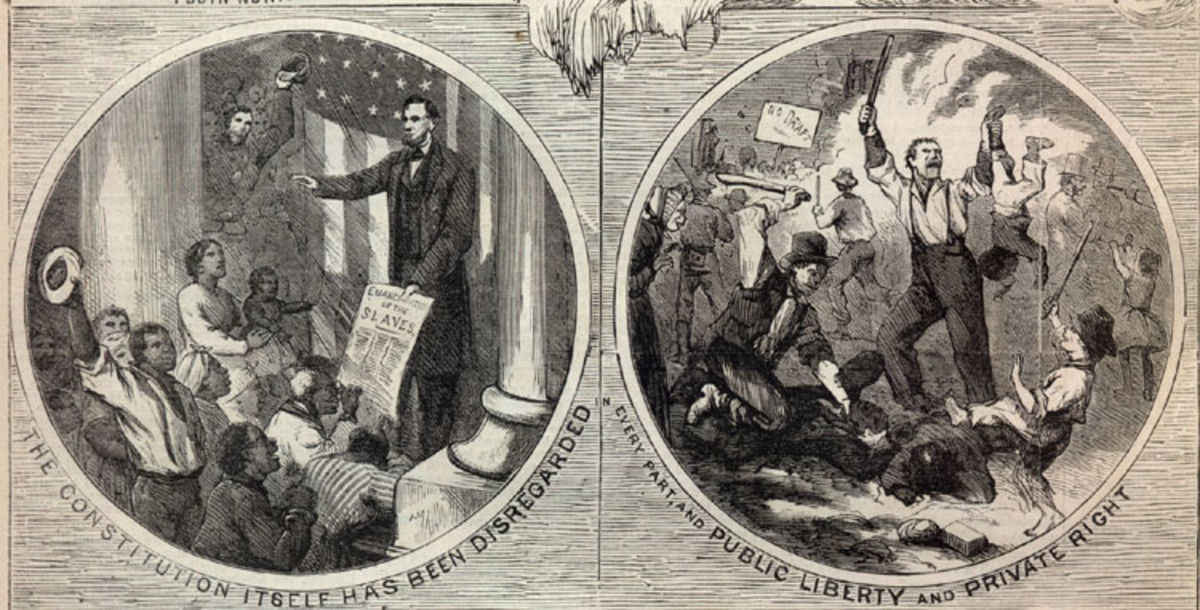American Perspective

By: Wayne Brown
One does not have to read some of my writing very long to figure out that I am a conservative in my philosophy and political tone. I recently had a reader ask me the question as to whether I could be a conservative and not also be a Republican. If so, how was that possible? It made sense to me but then he stated that he was confused on the issue so I grabbed some inspiration from his confusion and decided to write about it.
For much of the history of America, we have lived under a two party political system. Sure there have been other parties over time but they have proved to be flash in the pan politics and rapidly disappeared from the landscape over the course of time. In essence, I guess you could say that the surviving two parties represent the opposite ends of polarity within our society at its extremes. As the needle moves away from the extremes, we find the moderates and at the middle ground, the independent voter, who claims no party affiliation.
The Democratic Party is representative of the more liberal philosophy within our society. It is also the party of the “progressive” movement. Both the liberal and the progressive aspects of the Democratic Party tend to temper the thinking away from traditional models and toward new and sometimes untried methodology. The Democrats are often described as the “Party of the Left” as a result of this orientation. Democrats lean toward a system of fulfilling social needs which tends to grow the size of government over time. Generally, the Democrat philosophy subscribes to government overseeing as much as possible the welfare of the people.
The Republican Party is the party of “mixed conservatism” which runs a broad gambit spanning everything from the business and economic spectrum to that of religion and politics. The Republican view tends to lean toward tradition, historical validity, and the notion that small government is essential to the welfare of a democratic republic. Due to the broad nature of the conservative belief spectrum, the Republicans seem to suffer more conflicts within the party as to what the primary issues should be at any given time. This characteristic has proved to be a disadvantage for the party in many instances.
Regardless of the political leaning of either party, both define a system of “party planks” or primary issues on which they attempt to attract voters. These planks of their platform are thought to represent the primary issues of concern with the voting public and each party offers its particular perspective on those issues. This is known as the “party line” or as of late referred to as “the talking points” of the party. No matter what you call them, the information represents the “group think” of the party.
So can you be a liberal and not be a Democrat? Or can you be a conservative and not be a Republican? I think, in both cases, the answer is definitely “yes”. There are many forms of liberalism that span the spectrum of thinking. For example, one could be a socialist who certainly thinks on a liberal slant but has nothing else in common with the Democratic Party. One could also be a religious fanatic and believe that all people should be governed by nothing less than The Bible. While this is certainly a most conservative viewpoint, it does not necessarily mean this person has anything else in common with the Republican Party.
Now, let’s switch it around and ask the question in a different manner. Can one be a Democrat and not be a liberal? Or can one be a Republican and not be a conservative? If we subscribe to the spirit of the philosophy of each party, I think we find that answer is likely “no”. If that makes no sense to you, then perhaps the information covered it the next paragraph will help to clear it up.
In essence by assigning names to the key political parties, there is a fogging of the lens for some. Democrat does not literally mean “liberal” nor does the word Republican literally mean “conservative”. It is the association philosophically that attaches the word or party label to the thinking. Thus one can conclude that if an issue is studied by the Democratic Party, then their official position on that issue will likely have a liberal slant. So, if a person describes themselves politically as a “Democrat”, in essence, they are also saying that they abide by the liberal mindset and vice-versa for the “Republican”.
So, how do I know if I should claim to be a liberal versus a Democrat or a conservative versus a Republican? I think the answer can come from only one source…yourself. You are the one who knows in your own heart and mind what you feel and what you think. That really becomes the determining factor. How do I feel about this issue? What do I think? If you can come up with a perspective, then you have ownership of those feelings and that mindset. Of course, it may not be original and you may not be the first person to feel that way. But, the important thing is that you came up with the perspective within yourself thus you have ownership.
Conversely, when the Democratic Party mails out their informational packets to you and you read the information item by item, then you are no longer making the decisions about what is important and what is not. The same would be true in the Republican perspective. Now, you are reading the party line. Your decision-process now faces the litmus test of validation. In other words, do you agree with the perspectives as they are stated? If you do not, then you may want to question whether you have any business in a political party affiliation.
Personally, I try to form my own opinions on issues to the greatest extent that I can. Honestly, there are some issues on which I am sitting on the “null” in that I do not see a great value in having a particular perspective on them nor do I see any significant damage in going either way on the decision. Basically, I can live with it either way…that’s my perspective on that particular issue. On the issues I am more passionate about, I try to form my own opinion and I use the information available to test my opinion. For the most part, the best test is just sheer common sense. If the proposed outcome does not make sense, it is probably not a good idea to go that direction. Use common sense and seek out information in order to form your own perspective. If you are like me, that perspective will likely take a conservative slant in almost every case because that is my nature as a person. That’s not to say that I am right about everything and someone of a liberal slant is wrong. It is to say that I am far more comfortable with my perspective than the alternative. That’s what makes me a conservative but not necessarily a Republican.
I think most of us have been told by our parents at one time or other to always “think for ourselves.” In fact, most of us heard it so much it just became a worn-out cliché to which we paid little real attention. But, it is in fact an extremely important part of our lives and a very necessary process if we take a responsible role as a citizen of this country. First and foremost, think for yourself. Then, if you feel the need to belong, attempt to match that thinking with those who hold similar perspectives.
I have always been wary of fanaticism in any form whether it is in the political or religious arena. When we mix fanaticism with “group think” we often get disastrous results such as the Jim Jones Kool-Aid mass suicides or the Waco standoff with the Branch Davidians. There are those who can speak, reason, and inspire on such a level as to defy one’s own ability to reason for themselves. Given that set of circumstances, we can find a large group of people following the mindset of one or a small handful of leaders. History has shown time and again that the outcome of such blind following can be tragic.
When I hear someone describe themselves as a Republican or as a Democrat, I assume they have chosen that affiliation because what they believe individually is aligned with the premise of that party. I hope they have taken that first step and decided “what they think” on the basis of what really makes sense as opposed to just blindly stepping into the ranks and allowing the party to decide for them “what they think”. Unfortunately, the latter is all too often the case and it is easy to identify because the person involved stumbles all over themselves when asked to state their views and defend them in any way. When one ends up in this situation, they have already swallowed the Kool-Aid.
I issue this caution because organizations change over time. Look back to the 1950’s and you will find that the Democratic Party was much more “conservative” in nature and philosophy than it is today. At that point in time, the southland of America was owned by the Democratic Party thus the term, “Southern Democrat”. Today, that trend has been heavily reversed and much of the southland leans to the Republican orientation. While “liberalism” is not necessarily bad, the orientation of the Democratic Party lends itself to individuals and sub-groups of Socialist, Marxist, and Communist orientations. Eventually, these sub-groups gain footholds on the power within the party and begin to influence the thinking and the perspective of the party. To blindly call yourself a “Democrat” without examining the belief system and how it matches up with your own perspectives may not be the best choice. This is just an example as a similar argument might also be made of the Republican perspective but from a different slant.
Some individuals feel more comfortable when they ‘belong’. They want to be a part of a group and experience the warmth of the herd. There is certainly nothing wrong with that desire as long as they take the necessary precautions to make sure they are aligning themselves with an organization that does share their own perspectives. Then, and only then, can you describe yourself as a “Democrat” or as a “Republican” and know in your heart that this is where you stand and where you belong.
© Copyright WBrown2010. All Rights Reserved.







![American Politics: The BIG LIE in Politics, From The Republican Presidential Convention [124] American Politics: The BIG LIE in Politics, From The Republican Presidential Convention [124]](https://images.saymedia-content.com/.image/t_share/MTc2NDYyMjI1MzEyNjU1MzIy/the-big-lie-in-politics-from-the-conservative-side.jpg)

